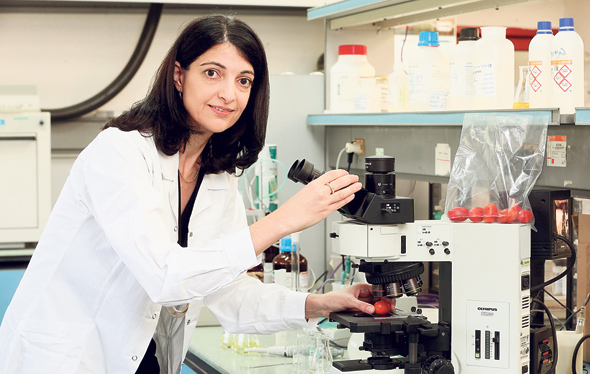Scientist Researching Plastics Aims to Eliminate the New Car Smell for Good
Rotem Shemesh heads a lab that develops innovative plastics for Israeli petrochemical company Carmel
Plastic is a great substance, according to Rotem Shemesh, head of research and development and customer service at Israeli petrochemical company Carmel Olefins Ltd. “Everyone loves plastic,” she claimed in a recent interview with Calcalist.
Shemesh first started working for Carmel—a subsidiary of Israeli oil refining company Bazan Group and the country’s sole manufacturer of petrochemical raw materials for the plastics industry—in 2002, fresh out of her chemical engineering studies at Technion Israel Institute of Technology. Shemesh has since completed a PhD in biotechnology and now heads Carmel’s lab, which employs 15 people and is dedicated to developing innovative plastics.

Despite growing awareness of its problematic status as one of the world’s major pollutants, plastic does not seem to be going anywhere. Consumption is skyrocketing and according to Shemesh, 408 million tonnes of plastics were manufactured worldwide in 2015, three times more than in 1990. According to estimates by The International Monetary Fund, by 2050, global manufacture of plastics will reach 1.6 billion tonnes a year.
Plastic has several advantages that make manufacturers turn a blind eye to its problematic nature as a non-perishable byproduct of the greenhouse effect-causing oil refinement process. And those advantages are quite significant—it is a durable yet flexible, cheap, lightweight, and safe substance, which does not emit chemicals, despite being a chain of polymers created as a result of a long chemical process, Shemesh attempted to explain the allure of the substance. Plastic does not rust like metal or shatter like glass, it is easy to mold and comfortable to work with, she added.
The holy grail of the plastic industry is recycling and earlier this month, Carmel’s lab, together with other Israeli plastic-focused companies, won a NIS 20 million (approximately $5.75 million) grant from the country’s tech investment arm the Israel Innovation Authority to accelerate the development of new recycling processes.
Of the plastic waste produced globally to date, 90.5%, or 6.3 billion tonnes, has not been recycled, according to the U.K.’s Royal Statistical Society, and is instead spread over landfills and oceans. The European Union has set a goal of recycling 50% of all plastic waste by 2040, but the reality is, at least currently, a different story altogether.
“Today, it is only possible to recycle 14%-18% of all plastic, mostly of the simplest kind used to manufacture drinking bottles,” Shemesh said. Ways to recycle complex plastic compounds or plastics with food remnants on them have yet to be discovered. Recycled plastics are 30% cheaper than new plastics, so plastic manufacturers are eager to develop new recycling processes, Shemesh said.
Another focus of Shemesh’s plastic lab is antimicrobial plastic packaging that can prolong the shelf life of food products without adding artificial preservatives to the food itself. The lab developed a patented bag that releases plant-derived etheric oils over time, according to the specific conditions each product requires to remain fresh. The lab has received a 7 million euros (approximately $7.9 million) grant from the EU for this end, and the bags it developed are being used to package meat, cheese, and cherries in Europe.
According to data presented to Shemesh by organic breadmakers in the U.S., about 50% of all products are returned to the manufacturer and destroyed simply because they have expired. Prolonging the shelf life will reduce waste and is very much in the interest of food manufacturers, she said.
Other products being developed by the lab include plastic-infused fabrics capable of maintaining a desired temperature, which can be used as cosmetic facial masks, as heat or cold-preserving food packaging, and as a way to maintain heat in solar water heaters after sundown.
The car industry is also considered one of the most prominent plastic consumers in the world. A car has 150 kilograms of plastic in it, which makes it lighter and more efficient when it comes to fuel consumption, Shemesh said. “Carmakers want to replace as many metal parts as possible with plastic parts to reduce the vehicle’s weight even further,” she added.
One of her team’s goals is to eliminate what many customers consider the best part of buying a vehicle: the new car smell. The smell, Shemesh said, comes from particles emitted by the plastic, which people then breathe. Though not poisonous, these particles have no business in our lungs, she said. “If we are successful, new cars will come without the new car smell,” she added.



